What’s in today’s article?
- Why in news?
- What is digital health?
- Why is digital health important?
- What are the challenges of digital health?
- News Summary: Global Initiative on Digital Health launched
- What is GIDH?
- What are the aims of GIDH?
- What are the pillars of GIDH?
- What are the strategies to be employed by GIDH?
Why in news?
- The World Health Organization (WHO) and the G20 India presidency announced a new Global Initiative on Digital Health (GIDH).
- GIDH was announced at the recently concluded Health Minister’s Meeting of the G20 Summit hosted by the Government of India.
What is Digital Health?
- Digital health refers to the use of technology, such as mobile devices, software applications, and other digital tools, to improve health and healthcare delivery.
- Basically, it is a multidisciplinary concept that includes concepts from an intersection between technology and healthcare.
- It encompasses a wide range of technologies and services, including telemedicine, electronic health records, wearable devices, health information exchange, and more.
- India’s CoWIN, UNICEF’s RapidPro and FamilyConnect etc. are few notable examples of digital health initiatives.
- The real-time information platform, RapidPro, is a core solution in UNICEF’s digital health portfolio.
- UNICeF’s FamilyConnect sends targeted life cycle-based messages via SMS to pregnant women, new mothers, heads of households etc.
Why is Digital Health important?
- Empowers Patients
- Digital tools are giving providers a more holistic view of patient health through access to data and giving patients more control over their health.
- Hence, it empowers patients to make better-informed decisions about their own health.
- E.g., wearable devices can monitor vital signs and provide real-time feedback to patients and clinicians.
- Treatment of Disease
- Digital health tools provide new options for facilitating prevention, early diagnosis of life-threatening diseases, and management of chronic conditions outside of traditional health care settings.
- Other benefits
- Reduce inefficiencies; Improve access; Reduce costs; Increase quality, and Make medicine more personalized for patients.
- Support overall universal health coverage targets
- Digital health is a great enabler in delivery of healthcare services and has the potential to support overall universal health coverage targets.
- This is because it can ensure availability, accessibility and affordability, and equity of health services.
- For example, telemedicine allows patients to connect with healthcare providers remotely.
- Digital health is a great enabler in delivery of healthcare services and has the potential to support overall universal health coverage targets.
What are the Challenges of Digital Health?
- Equitable access
- Universalization of digital health and enabling of equitable access to healthcare services across the world, particularly for low- and middle-income countries is challenging.
- The issue of accessibility becomes more daunting against the backdrop of low digital literacy and low-level of internet penetration.
- Ethical Challenges related to privacy, security and data ownership
- The increasing digitization of healthcare and the growth of mobile and IoT devices as data collection tools raises many ethical issues.
- One commonly recurring theme relates to the exact nature of the role of consumer tech companies, such as Amazon, Apple etc. who have all entered the digital health domain.
- Such companies offer solutions for collecting, storing and analysing health data which raises issues relating to privacy, data protection and informed consent.
- Analysts also raise ethical concerns relating to data ownership.
- Ethical challenges related to regularisation of digital health technologies
- The growth of apps and technologies developed for a consumer market blurs the lines between what is medical and non-medical devices.
- Hence, it raises ethical challenges relating to how to regularize such technologies.
- Data management
- Due to the massive amounts of data collected from a variety of systems that store and code data differently, data interoperability is an ongoing challenge.
News Summary: Global Initiative on Digital Health launched
What is GIDH?
- GIDH is one of the key deliverables of India’s G-20 Presidency.
- It will consolidate the evidence and amplify recent and past gains in global digital health while strengthening mutual accountability to enhance the impact of future investments.
- GIDH will be a WHO Managed Network (“Network of Networks”) that will promote equitable access to digital health.
- It will do so by sharing digital goods and knowledge.
- The GIDH will ensure inclusivity, integration, and alignment of healthcare goals by not leaving anyone behind.
What are the aims of GIDH?
- ALIGN efforts to support the Global Strategy on Digital Health 2020–2025;
- SUPPORT quality assured technical assistance to develop and strengthen standards-based and interoperable systems aligned to global best practices, norms and standards;
- FACILITATE the deliberate use of quality assured digital transformation tools that enable governments to manage their digital health transformation journey.
What are the pillars of GIDH?
- It will have four pillars:
- investment tracker; ask tracker to track technologies the countries need; a library of available digital tools, and a platform for knowledge-sharing to implement these technologies at scale.
Image caption: Pillars of GIDH
What are the strategies to be employed by GIDH?
- The GIDH will bring countries and partners together to achieve measurable outcomes by:
- developing clear priority-driven investment plans for digital health transformation;
- improving reporting and transparency of digital health resources;
- facilitating knowledge exchange and collaboration across regions and countries to accelerate progress;
- increasing technical and financial support to the implementation of the Global Strategy on Digital Health 2020–2025 and its next phase.
Q1) What is CoWIN?
CoWIN stands for COVID Vaccine Intelligence Network. It is an online platform developed by the Indian government to facilitate the efficient and transparent distribution of COVID-19 vaccines across the country. The CoWIN platform provides several features, including vaccine registration, appointment scheduling, and vaccination certification.
Q2) What is UNICEF’s FamilyConnect ?
UNICEF’s FamilyConnect is an innovative mobile application designed to provide pregnant women and new mothers with the information and support they need to ensure the health and wellbeing of their babies and themselves. The app provides a range of features, including personalized pregnancy and postnatal care guidance, health tips, nutrition advice, and parenting resources.
Source: WHO-managed grid to promote equitable access to digital health | PIB | World Health Organisation
Last updated on June, 2025
→ UPSC Notification 2025 was released on 22nd January 2025.
→ UPSC Prelims Result 2025 is out now for the CSE held on 25 May 2025.
→ UPSC Prelims Question Paper 2025 and Unofficial Prelims Answer Key 2025 are available now.
→ UPSC Calendar 2026 is released on 15th May, 2025.
→ The UPSC Vacancy 2025 were released 1129, out of which 979 were for UPSC CSE and remaining 150 are for UPSC IFoS.
→ UPSC Mains 2025 will be conducted on 22nd August 2025.
→ UPSC Prelims 2026 will be conducted on 24th May, 2026 & UPSC Mains 2026 will be conducted on 21st August 2026.
→ The UPSC Selection Process is of 3 stages-Prelims, Mains and Interview.
→ UPSC Result 2024 is released with latest UPSC Marksheet 2024. Check Now!
→ UPSC Toppers List 2024 is released now. Shakti Dubey is UPSC AIR 1 2024 Topper.
→ Also check Best IAS Coaching in Delhi
























